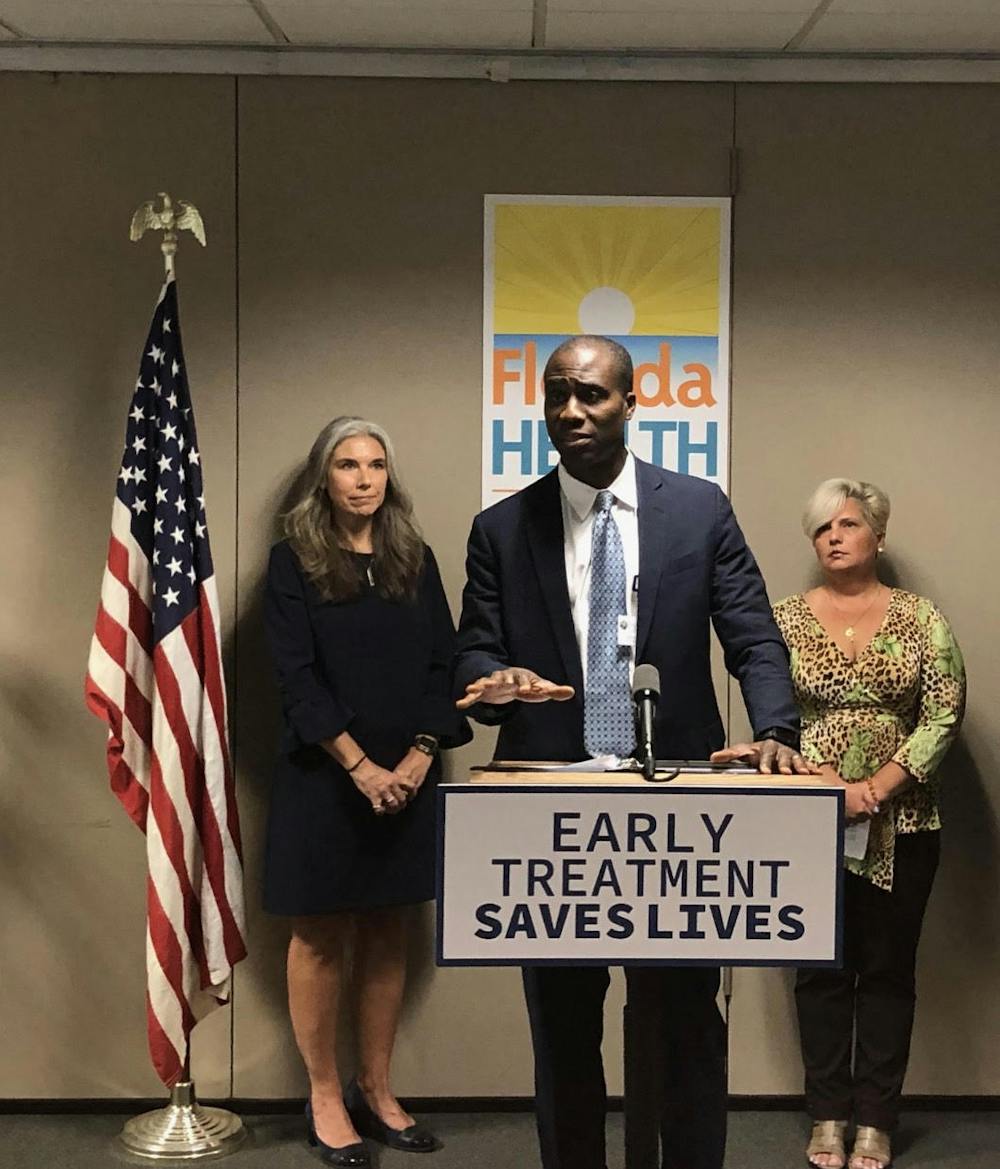The speed of Dr. Joseph Ladapo’s tenure approval along with his controversial views on COVID-19 measures have some questioning his meteoric rise.
The same week Gov. Ron DeSantis appointed Ladapo as Florida’s next surgeon general and secretary of the Department of Health, Ladapo received professorship at UF with tenure.
Controversy has clouded his role at UF after reports showed Board of Trustees Chair Morteza “Mori” Hosseini, who has ties to DeSantis, personally expedited Ladapo’s resume to UF Health despite his controversial views on COVID-19 measures. Ladapo’s hiring brought into question the school’s tenure process, which typically takes about a year and a half.
Ladapo is a health policy researcher and expert in cardiovascular health and preventive medicine from UCLA. In the past, he has criticized COVID-19 lockdowns, mask mandates and the safety of vaccines.
The vaccines were developed using science that has been around for decades, according to the Centers for Disease Control and Prevention. They are safe and effective at preventing severe illness from COVID-19 and limiting the virus’s spread.
Requests for comments on Ladapo’s views were redirected to the Florida Department of Health, which did not respond to several requests.
The governor’s office told UF that Ladapo was being considered for state surgeon general, UF Health spokesperson Ken Garcia said. Ladapo separately and independently contacted UF about a potential opportunity to fill a vacant position in the College of Medicine, he said.
Faculty provided favorable comments about Ladapo’s appointment, Garcia wrote, according to a Gainesville Sun article.
However, Garcia did not provide positive commentary from anyone other than himself after several requests. The only faculty willing to speak on the record mainly expressed concern.
Bob Harmon, a former UF internal medicine faculty member, said he was surprised how quickly UF gave Ladapo a professorship in a politicized process. He was also concerned when he discovered Ladapo’s statements on the pandemic, which starkly contrast with CDC guidelines.
“[It] certainly raises questions as [to his] fitness to serve,” Harmon said.
Such controversial positions led more than 300 Florida medical professionals, including Harmon, to sign a letter to the state senate. The letter urged senators to fully vet Ladapo on his COVID-19 response during the confirmation process, before deciding whether to confirm him as surgeon general.
“Through the confirmation process, you can help clarify Dr. Ladapo’s — and by extension, our state government’s — commitment to science- and evidence-based safety measures so we can better protect the health and safety of all Floridians during the COVID-19 pandemic,” the letter read.
When his appointment to surgeon general was announced Sept. 21, Ladapo vowed to base his decisions on science. But critics say Ladapo has spread misinformation contributing to vaccine hesitancy.
Faculty members have academic freedom and are able to speak their mind, Harmon said.
But Harmon believes it’s unusual for a public health leader to hold positions counter to science.
“That’s not a good example for college students,” Harmon said.
Ladapo’s positions also don’t fulfill the role of what an epidemiologist should be, Linda Cottler, associate dean for research in UF’s College of Public Health and Health Professions, wrote in an email.
“An epidemiologist’s goal is to follow best scientific practices and work with and for the community to be trustworthy,” Cottler wrote.
Ladapo’s position will come with tenure, which involves giving someone a permanent post, subject to approval by the UF Board of Trustees. The first step in the process was a faculty vote completed in mid-September, but the results are confidential, Garcia wrote in an email.
Tenure is essential for a democratic society, Robert Hatch, a physician and UF professor of community health and family medicine, said. It assures there’s a group of people who can develop expertise and express information and opinions without fear of losing their job.
While Hatch values diverse views and free expression, he said Ladapo can expect to have his views vigorously challenged if he brings them up in the classroom. He has heard Ladapo’s resume and track record are impressive, and he suspects if Ladapo had gone through the typical process, he would’ve been awarded tenure. But he still questions how fast Ladapo received his tenure.
Hatch said UF faculty should be left with decisions on tenure, not an outside body.
“I always thought that our tenure process followed some guidelines, and for all I know, they were followed in this case,” Hatch said. “But if we don’t have well specified criteria and process, then we need that clarified and specified.”
Contact J.P. Oprison at joprison@alligator.org. Follow him on Twitter @JOprison.

JP is a fourth-year journalism major with a minor in history. He is currently the health reporter for The Alligator, focusing on how the pandemic is affecting Alachua County and the thousands of students in Gainesville. In his free time, JP likes to exercise at the gym and relax on the beach.






